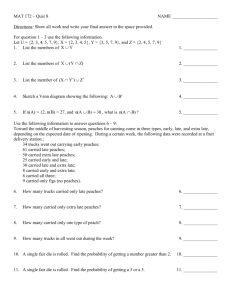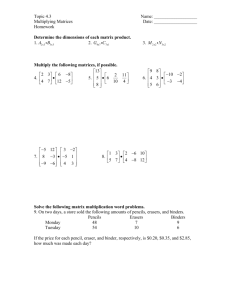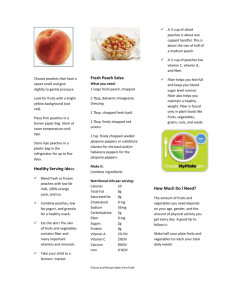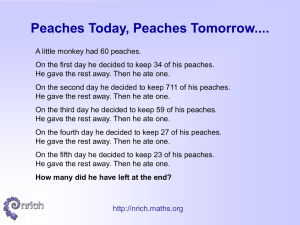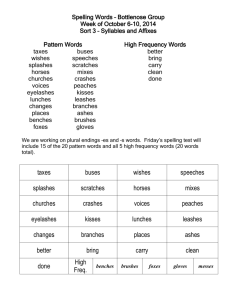Premium Tree-Ripened Fruit – A Ripening Market Opportunity
advertisement
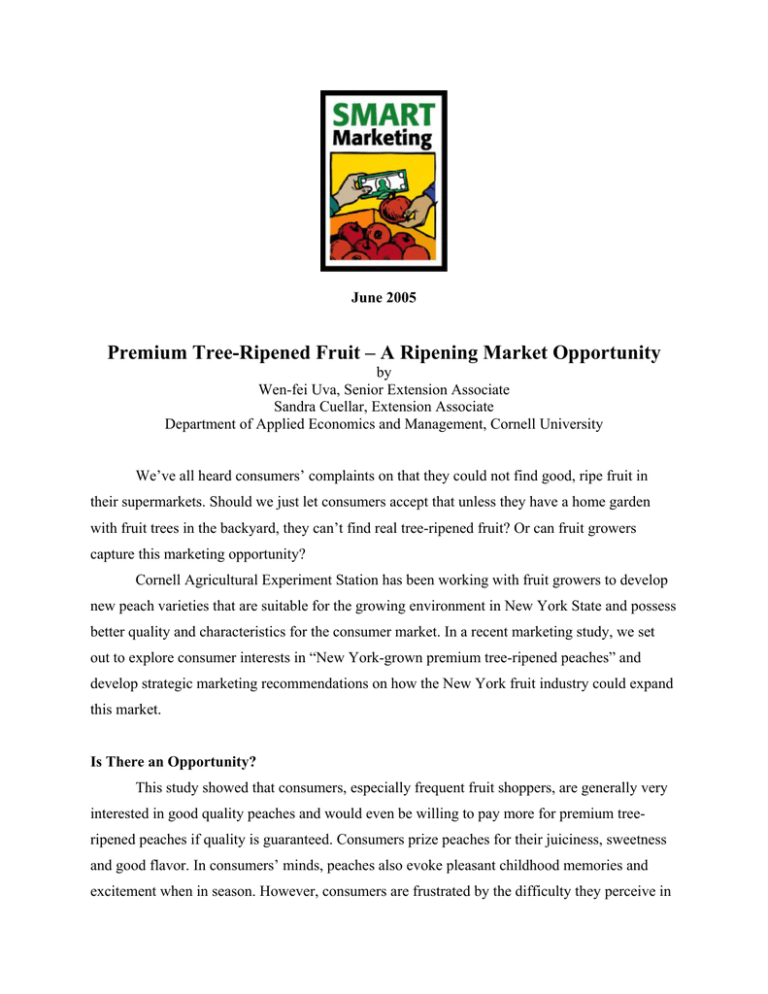
June 2005 Premium Tree-Ripened Fruit – A Ripening Market Opportunity by Wen-fei Uva, Senior Extension Associate Sandra Cuellar, Extension Associate Department of Applied Economics and Management, Cornell University We’ve all heard consumers’ complaints on that they could not find good, ripe fruit in their supermarkets. Should we just let consumers accept that unless they have a home garden with fruit trees in the backyard, they can’t find real tree-ripened fruit? Or can fruit growers capture this marketing opportunity? Cornell Agricultural Experiment Station has been working with fruit growers to develop new peach varieties that are suitable for the growing environment in New York State and possess better quality and characteristics for the consumer market. In a recent marketing study, we set out to explore consumer interests in “New York-grown premium tree-ripened peaches” and develop strategic marketing recommendations on how the New York fruit industry could expand this market. Is There an Opportunity? This study showed that consumers, especially frequent fruit shoppers, are generally very interested in good quality peaches and would even be willing to pay more for premium treeripened peaches if quality is guaranteed. Consumers prize peaches for their juiciness, sweetness and good flavor. In consumers’ minds, peaches also evoke pleasant childhood memories and excitement when in season. However, consumers are frustrated by the difficulty they perceive in selecting peaches at the proper ripening stage to get the quality they like. The main consumer complaint about peaches they bought is that the peaches were not ripe enough or never reached the proper ripening (or quality) condition. Quality and consistency of the product are key factors for consumer satisfaction, and a high level of satisfaction, in turn, increases consumer demand and repeat purchases for fresh peaches. If consumers know that quality and consistency exist, they seem to be willing to pay higher prices and buy fewer peaches in order to get the product they like. Consumers in this study feel that good quality peaches are available at farm stands or farmers’ markets but appear to be less available in the supermarkets where they typically shop. Dissatisfaction with peaches commonly available in supermarkets (usually from the West Coast) and the expectation of lower prices and better quality for locally-grown products often lead shoppers to prefer and to search for locally grown peaches. This presents an opportunity for New York-grown peaches at the direct marketing outlets such as farm stands and farmers’ markets, as well as for marketing of high quality, premium locally-grown peaches through supermarkets. Moreover, although consumers who were disappointed by the quality of peaches they had purchased in the past were less likely to buy the fruit, or were planning to buy less of it in their future shopping trips, they were more willing than satisfied consumers to pay a higher price and give it another try if they could get something that guaranteed the quality they like. Many supermarket fruit shoppers are in this category. So the fruit industry should capture this market opportunity and develop a collaborative program with supermarkets that are interested in differentiating themselves as suppliers of premium produce for their customers. What are the Challenges? There are several challenges when designing a marketing program to receive a premium price for high quality New York tree-ripened peaches. Although consumers identify tree-ripened peaches as better quality than run-of-the-mill peaches, many did not know if the peaches they bought were tree-ripened or not, while others assumed that if the peaches were purchased from a local source (farm stand or farmers’ market), they were tree-ripened. Consumers also showed little knowledge on the different varieties of peaches available in the market and of the production areas in the country. 2 In addition, New York peaches face significant competition from out-of-state peaches, especially California and Pennsylvania. Some consumers in this research viewed California peaches as larger and Pennsylvania peaches as more flavorful and predictable than New York peaches. Moreover, some expected a lower price for locally grown products. Therefore, the New York peach industry needs to be able to develop a production and marketing system that can deliver products that can better meet consumer expectations – such as quality guaranteed New York-grown premium tree-ripened peaches. How to Market Them? When promoting “quality-guaranteed New York-grown premium tree-ripened peaches”, a good position statement, innovative packaging, and clear labeling at the point of purchase will be the major means of communicating and influencing a potential buyer. Labeling should emphasize high quality and be used as boldly and as creatively as possible to justify the higher price and stimulate sales for the “quality-guaranteed premium product”. Some recommended marketing strategies are: • Use clear identifiers, such as “tree-ripened”, “quality-guaranteed”, “premium”, “New York-grown”, or “locally grown” to identify the fruit as being different from run-of-the crop peaches commonly available (perceived as unpredictable). • Use a descriptor that can justify the higher price, and tap into the wellsprings of remembrances that people have about peaches (juicy, aroma, etc.). • Communicate their local origin and thus underscore their freshness and dependability of quality and ripeness through labels such as “Premium OldFashioned Peaches”, “Truly Tree-Ripened in XXX County, New York”. • Use special marketing communication tools, such as a “Picked on (DATE)” sticker to emphasize freshness. • Offer unique packaging to convey premium image. A “Peach Caddy” with 3-4 individual compartments can stimulate initial purchase interest, and making good quality, pre-assembled gift baskets available in supermarkets is an untapped market among female and older shoppers. Moreover, given the narrow marketing window when fresh New York peaches are available and the excitement the arrival of the peach season appears to generate, both run-of-the- 3 mill and premium varieties can benefit from intensive promotion of their arrival. Finally, results from this study show that demographic factors generally do not affect consumer behavior in terms of purchasing run-of-the-mill peaches or tree-ripened peaches. Therefore, promotional programs targeting specific consumer groups are not necessary. Generating consumer satisfaction through good and consistent quality products is the key to successfully marketing “New York-grown, quality-guaranteed, premium tree-ripened peaches.” * The complete report of Consumer Preference and Marketing Opportunities for Premium “Tree-Ripened Peaches” in New York State can be found at http://hortmgt.aem.cornell.edu/ or by contacting Wen-fei Uva at WL32@CORNELL.EDU. "Smart Marketing" is a monthly marketing newsletter for extension publication in local newsletters and for placement in local media. It reviews the elements critical to successful marketing in the food and agricultural industry. Articles are written by faculty members in the Department of Applied Economics and Management at Cornell University. "Share the gift of communication." Please cite or acknowledge when using this material. 4
